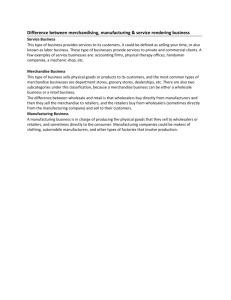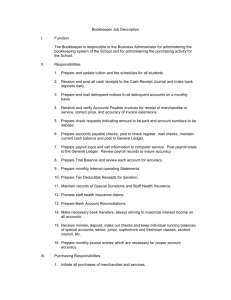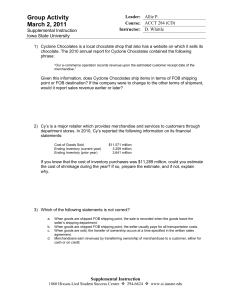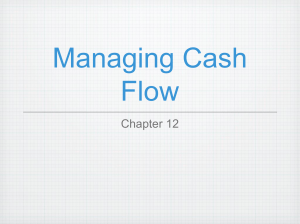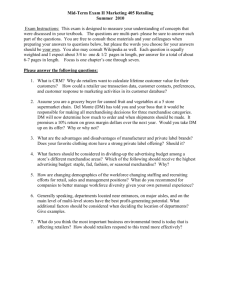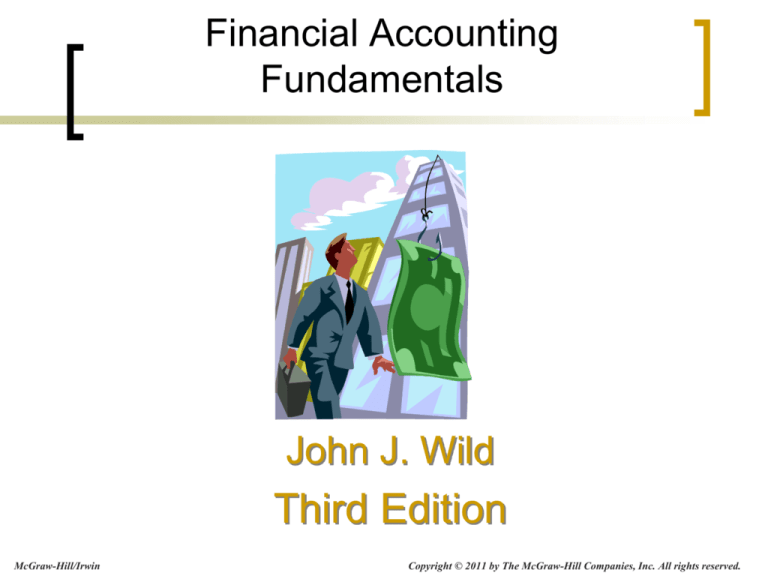
Financial Accounting
Fundamentals
John J. Wild
Third Edition
McGraw-Hill/Irwin
Copyright © 2011 by The McGraw-Hill Companies, Inc. All rights reserved.
Chapter 04
Accounting for
Merchandising Operations
Conceptual Learning Objectives
C1: Describe merchandising activities and
identify income components for a
merchandising company.
C2: Identify and explain the inventory asset
and cost flows of a merchandising
company.
4-3
Analytical Learning Objectives
A1: Compute the acid-test ratio and
explain its use to assess liquidity.
A2: Compute the gross margin ratio and
explain its use to assess profitability.
4-4
Procedural Learning Objectives
P1: Analyze and record transactions for
merchandise purchases using a perpetual
system.
P2: Analyze and record transactions for
merchandise sales using a perpetual system.
P3: Prepare adjustments and close accounts for
a merchandising company.
P4: Define and prepare multiple-step and
single-step income statements.
P5: Appendix 4A – Record and compare
merchandising transactions using both
periodic and perpetual inventory systems
(see text for details).
4-5
C1
Merchandising Activities
Service organizations sell time to
earn revenue.
Examples: Accounting firms, law firms,
and plumbing services
Revenues
Minus
Expenses
Equals
Net
income
4-6
C1
Merchandising Activities
Merchandising Companies
Manufacturer
Wholesaler
Retailer
Customer
4-7
Reporting Income for
a Merchandiser
C1
Merchandising companies sell products to earn revenue.
Examples: sporting goods, clothing, and auto parts stores
Net
sales
Minus
Cost of Equals
goods sold
Gross
profit
Minus
Expenses
Equals
Net
income
Merchandising Company
Income Statement
For Year Ended December 31, 2011
Net sales
Cost of goods sold
Gross profit
Operating expenses
Net income
$ 150,000
80,000
$
70,000
46,500
$
23,500
4-8
C2
Operating Cycle for a
Merchandiser
Begins with the purchase of merchandise and ends with
the collection of cash from the sale of merchandise.
Credit Sale
Cash Sale
Purchases
Cash
collection
Purchases
Merchandise
inventory
Accounts
receivable
Cash
sales
Merchandise
inventory
Credit sales
4-9
C3
Inventory Systems
Beginning
inventory
+
Net
purchases
= Merchandise
available for sale
Ending inventory
+
Cost of goods
sold
4-10
P1
Merchandise Purchases
On June 20, Jason, Inc. purchased $14,000 of
Merchandise Inventory paying cash.
Dr.
Jun. 20 Merchandise Inventory
Cr.
14,000
Cash
14,000
Purchase merchandise for cash
4-11
P1
Trade Discounts
Used by manufacturers and wholesalers
to offer better prices for greater
quantities purchased.
Example
Matrix, Inc. offers a 30% trade
discount on orders of 1,000
units or more of their popular
product Racer. Each
Racer has a list price of $5.25.
Quantity sold
Price per unit
Total
Less 30% discount
Invoice price
1,000
$ 5.25
5,250
(1,575)
$ 3,675
4-12
Vendor’s Invoice for
Purchase of Merchandise
P1
Seller
Invoice date
Purchaser
Order number
Credit terms
Freight terms
Goods
Invoice amount
Invoice
Main Source, Inc.
614 Tech Avenue
Nashville, TN 37651
S
o
l
d
T
o
P.O. 167
Item
AC417
Sales: 25
Invoice
Date
5/4/12
Number
358-BI
Name: Barbee, Inc.
Attn: Tom Bell
Address: One Willow Plaza
Cookeville, Tennessee
38501
Terms 2/10,n/30
Description
250 Backup System
Ship: FedEx Prepaid
Quanity
Price
500 $ 54.00
$
Amount
27,000
Sub Total
Ship Chg.
Tax
Total
$
27,000
27,000
We appreciate your business!
4-13
P1
Purchase Discounts
A deduction from the invoice price granted to induce
early payment of the amount due.
Terms
Discount Period
Credit
Period
Time
Due
Date of
Invoice
Due: Invoice
price minus
discount
Due: Full Invoice Price
4-14
P1
Purchase Discounts
2/10,n/30
Discount
Percent
Number of
Days
Discount Is
Available
Otherwise,
Net (or All)
Is Due in 30
Days
Credit
Period
4-15
P1
Purchase Discounts
On May 7, Jason, Inc. purchased $27,000 of
merchandise inventory on account, credit
terms are 2/10, n/30.
Merchandise Inventory
Accounts Payable
Dr.
27,000
Cr.
27,000
Purchase merchandise on account
4-16
P1
Purchase Discounts
On May 15, Jason, Inc. paid the amount due
on the purchase of May 7.
Dr.
27,000
May 15 Accounts Payable
Cash
Merchandise Inventory*
Cr.
26,460
540
Pai d accounts payabl e i n ful l
*$27,000 × 2% = $540 discount
4-17
P1
Purchase Discounts
After we post these entries, the
accounts involved look like this:
Merchandise Inventory
5/7
27,000 5/15
Bal. 26,460
540
Accounts Payable
5/15 27,000 5/7 27,000
Bal.
0
4-18
P1
When Discount is Not Taken
If we fail to take a 2/10, n/30
discount, is it really expensive?
365 days ÷ 20 days × 2% = 36.5% annual rate
Days
in a
year
Number
of additional
days before
payment
Percent
paid to
keep
money
4-19
P1
Purchase Returns and
Allowances
Purchase returns . . .
refer to merchandise a buyer acquires but then
returns to the seller.
Purchase allowance . . .
is a reduction in the cost of defective or
unacceptable merchandise that a buyer
acquires.
4-20
Purchase Returns and
Allowances
P1
On May 9, Matrix, Inc. purchased $20,000
of merchandise inventory on account,
credit terms are 2/10, n/30.
May 9
Merchandise Inventory
Accounts Payable
20,000
20,000
Purchase merchandise on account
4-21
P1
Purchase Returns and
Allowances
On May 10, Matrix, Inc. returned $500 of
defective merchandise to the supplier.
May 10 Accounts Payable
Merchandise Inventory
Dr.
500
Cr.
500
Returned defective merchandise
4-22
Purchase Returns and
Allowances
P1
On May 18, Matrix, Inc. paid the amount
owed for the purchase of May 9.
May 18
Accounts Payable
Cash
Merchandise Inventory
Dr.
19,500
Cr.
19,110
390
Pa i d a ccount i n ful l
Purchase
Returns
Amount Due
Discount
Cash Paid
$ 20,000
(500)
19,500
(390)
$ 19,110
4-23
P1
Transportation Costs
Buyer
Seller
FOB shipping point
(buyer pays)
Terms
FOB shipping point
FOB destination
Merchandise
FOB destination
(seller pays)
Ownership transfers
to buyer when goods
are passed to
Transportation
costs paid by
Carrier
Buyer
Buyer
Seller
4-24
P1
Transportation Costs
On May 12, Jason, Inc. purchased $8,000 of
merchandise inventory for cash and also
paid $100 transportation costs.
May 12 Merchandise Inventory
Cash
Dr.Dr.
8,100
Cr.
8,100
Paid for merchandise and transportation
4-25
P1
Quick Check
On July 6, 2011, Seller Co. sold $7,500 of merchandise to
Buyer, Co. on account; terms of 2/10,n/30. The shipping terms
were FOB shipping point. The shipping cost was $100. Which
of the following will be part of Buyer’s July 6 journal entry?
a. Credit Sales $7,500
b. Credit Purchase Discounts $150
c. Debit Merchandise Inventory $7,600
d. Debit Accounts Payable $7,450
FOB shipping point indicates the buyer ultimately
pays the freight. This is recorded with
a debit to Merchandise Inventory.
4-26
P1
Cost of Merchandise Purchased
Matrix, Inc.
Itemized Cost of Merchandise Purchases
For Year Ended May 31, 2011
Invoice cost of merchandise purchases
$ 692,500
Less:
Purchase discounts
(10,388)
Purchase returns and allowances
(4,275)
Add:
Cost of transportation-in
4,895
Total cost of merchandise purchases
$ 682,732
4-27
P2
Accounting for Merchandise Sales
Matrix, Inc.
Computation of Gross Profit
For Year Ended May 31, 2011
Sales
Less:
Sales discounts
Sales returns and allowances
Net sales
Cost of goods sold
Gross profit
$ 2,451,000
$ 29,412
18,500
47,912
$ 2,403,088
(1,928,600)
$
474,488
Sales discounts and returns and allowances are contra revenue accounts.
4-28
P2
Sales of Merchandise
On March 18, Diamond Store sold $25,000 of
merchandise on account. The merchandise was carried
in inventory at a cost of $18,000.
Mar. 18 Accounts Receivable
Sales
Dr.
25,000
Cr.
25,000
Sa l es of mercha ndi se on credi t
Cost of Goods Sold
Merchandise Inventory
18,000
18,000
To record cost of sa l es
4-29
P2
Sales Discounts
On June 8, Barton Co. sold merchandise costing $3,500
for $6,000 on account. Credit terms were 2/10, n/30. Let’s
prepare the journal entries.
Jun. 8
Accounts Receivable
Sales
Dr.
6,000
Cr.
6,000
Sales of merchandise on credit
Cost of Goods Sold
Merchandise Inventory
3,500
3,500
To record cost of sales
4-30
P2
Sales Discounts
On June 17, Barton Co. received a check for $5,880
in full payment of the June 8 sale.
Jun 17
Cash
Sales Discounts
Accounts Receivable
5,880
120
6,000
Received payment less discount
4-31
P2
Sales Returns and Allowances
On June 12, Barton Co. sold merchandise
costing $4,000 for $7,500 on account. The
credit terms were 2/10, n/30.
Jun. 12 Accounts Receivable
Sales
Dr.
7,500
Cr.
7,500
Sales of merchandise on credit
Cost of Goods Sold
Merchandise Inventory
4,000
4,000
To record cost of sales
4-32
P2
Sales Returns and Allowances
On June 14, merchandise with a sales price of $800 and
a cost of $470 was returned to Barton. The return is
related to the June 12 sale.
Jun. 14 Sales Returns and Allowances
Accounts Receivable
Dr.
800
Cr.
800
Customer returned merchandise
Merchandise Inventory
Cost of Goods Sold
470
470
Returned goods placed in inventory
4-33
P2
Sales Returns and Allowances
On June 20, Barton received the amount owed to it from
the sale of June 12.
Jun. 20
Cash
Sales Discount
Accounts Receivable
Dr.
6,566
134
Cr.
6,700
Recei ved payment l ess di scount
Sale
Return
Amount due
Discount
Cash received
$ 7,500
(800)
$ 6,700
(134)
$ 6,566
4-34
Completing the
Accounting Cycle
P3
Barton Company
Adjusted Trial Balance
December 31, 2011
Cash
Accounts receivable
Merchandise inventory
Supplies
Equipment
Accum. depr.- Equip.
Accounts payable
Salaries payable
Common Stock
Retained Earnings
Dividends
Sales
Sales discounts
Sales returns
Cost of goods sold
Admin. salaries expense
Sales salaries expense
Insurance expense
Rent expense
Supplies expense
Advertising expense
$
7,700
11,200
14,300
1,300
41,200
$
7,000
16,400
1,000
42,400
Next, let’s complete
the accounting cycle
by preparing the
closing entries for
Barton Company.
4,000
323,800
$
4,300
2,000
233,200
18,200
29,600
1,200
8,100
1,000
13,300
390,600
$
390,600
4-35
P3
Step 1: Close Credit Balances in
Temporary Accounts to Income Summary
Dec. 31 Sales
Income summary
Dr.
323,800
Cr.
323,800
To close credit balances
in temporary accounts
Barton Company
Adjusted Trial Balance (partial)
December 31, 2011
Salaries payable
Common Stock
Dividends
Sales
Sales discounts
Sales returns
Cost of goods sold
Admin. salaries expense
Sales salaries expense
Insurance expense
Rent expense
Supplies expense
Advertising expense
1,000
42,400
4,000
323,800
4,300
2,000
233,200
18,200
29,600
1,200
8,100
1,000
13,300
Income Summary
323,800
4-36
P3
Step 2: Close Debit Balances in
Temporary Accounts to Income Summary
Dr.
De c. 31
Incom e Sum m ary
Cr.
310,900
Sale s Dis counts
4,300
Sale s Re turns
2,000
Cos t of Goods Sold
233,200
Adm . Salarie s Expe ns e
18,200
Sale s Salarie s Expe ns e
29,600
Ins urance Expe ns e
1,200
Re nt Expe ns e
8,100
Supplie s Expe ns e
1,000
Adve rtis ing Expe ns e
13,300
To cl ose debi t ba l a nces i n tempora ry a ccounts
Income Summary
310,900
323,800
12,900
4-37
P3
Step 3: Close Income Summary to
Retained Earnings
Dec. 31 Income Summary
Retained Earnings
Dr.
12,900
Cr.
12,900
To close Income Summary account
Income S ummary
310,900
323,800
12,900
-04-38
P3
Step 4: Close Dividends to
Retained Earnings
Dec. 31 Retained Earnings
Dividends
Dr.
4,000
Cr.
4,000
To cl ose the di vi dends account
4-39
P4
Multiple-Step Income Statement
Barton Company
Income Statement
For Year Ended December 31, 2011
Sales
Less: Sales discounts
Sales returns
Net sales
Cost of goods sold
Gross profit
Operating expenses:
Selling expenses:
Salaries expense
$ 29,600
Advertising expense
13,300
General and administrative expenses:
Adm. salaries expense
$ 18,200
Insurance expense
1,200
Rent expense
8,100
Supplies expense
1,000
Total operating expenses
Net income
$ 323,800
$
$
4,300
2,000
6,300
$ 317,500
233,200
$ 84,300
42,900
28,500
71,400
$ 12,900
4-40
P4
Single-Step Income Statement
Barton Company
Income Statement
For Year Ended December 31, 2011
Net sales
Cost of goods sold
Operating expenses
Total expenses
Net income
$ 317,500
$ 233,200
71,400
304,600
$ 12,900
4-41
P4
Balance Sheet
Barton Company
Balance Sheet
December 31, 2011
Assets:
Cash
$
7,700
Accounts receivable
11,200
Merchandise inventory
14,300
Supplies
1,300
Equipment
41,200
Accum. depr.- Equip.
(7,000)
Total Assets
Liabilities
Accounts payable
Salaries payable
Total Liabilities
Equity
Common Stock
Retained Earnings
Total Liabilities
Total Liabilities & Equity
$
68,700
16,400
1,000
17,400
$
$
42,400
8,900
51,300
68,700
4-42
A1
Acid-Test Ratio
Acid-test
=
ratio
Acid-test
=
ratio
Quick assets
Current liabilities
Cash + S/T investments + receivables
Current liabilities
A common rule of thumb is the acid-test ratio should
have a value of at least 1.0 to conclude a company is
unlikely to face liquidity problems in the near future.
4-43
Gross Margin Ratio
A2
Gross
margin =
ratio
Net sales - cost of goods sold
Net sales
Percentage of dollar sales available to
cover expenses and provide a profit.
4-44
End of Chapter 04
4-45

